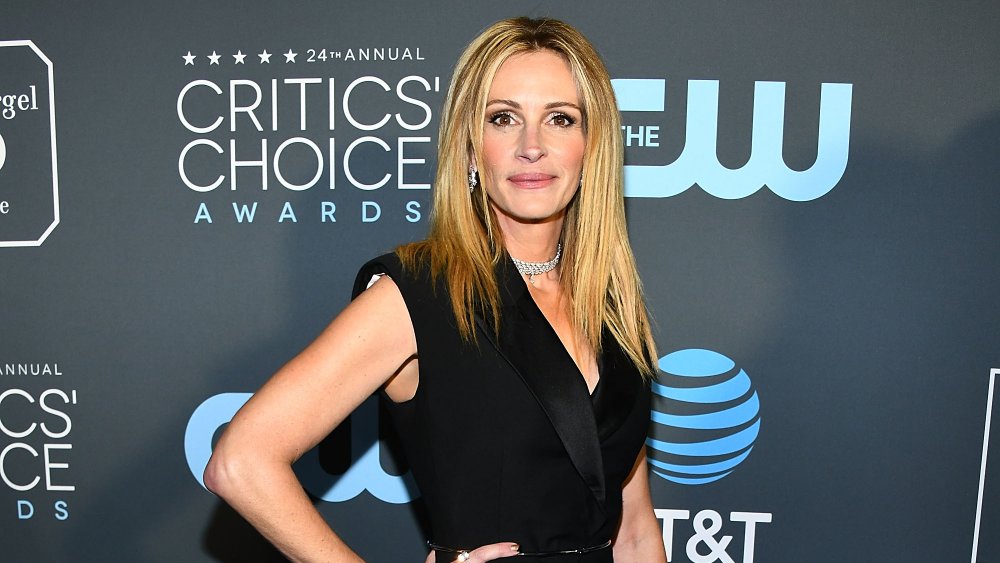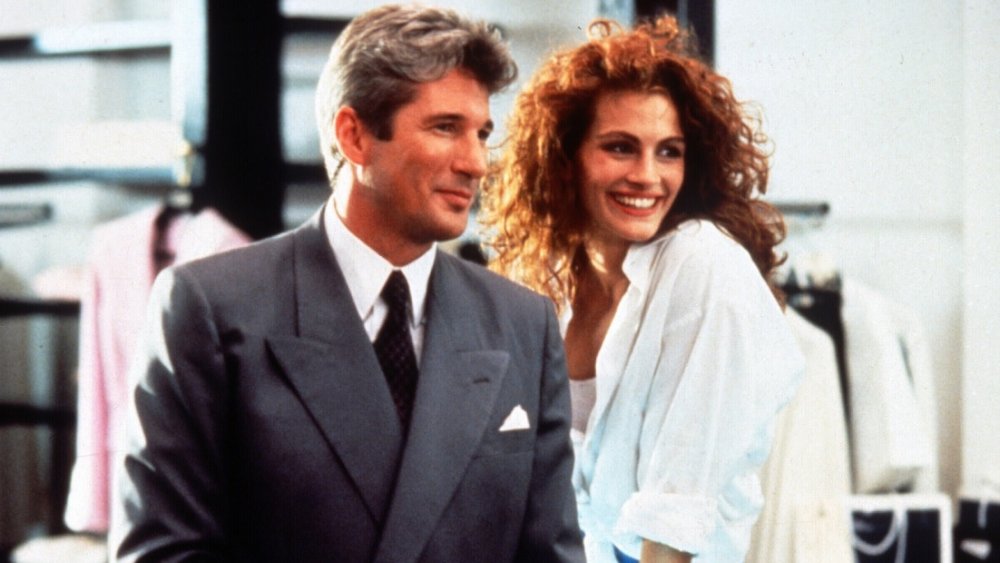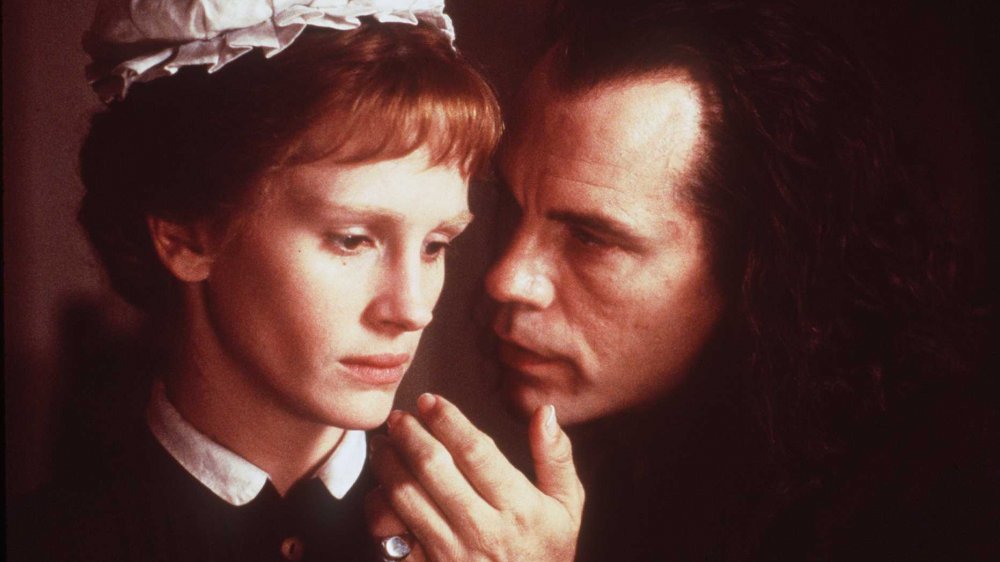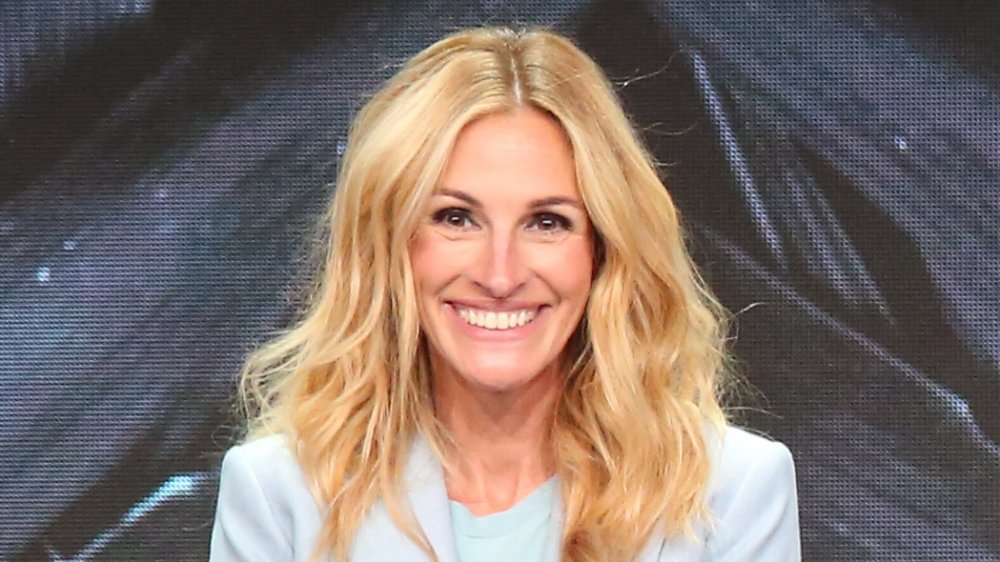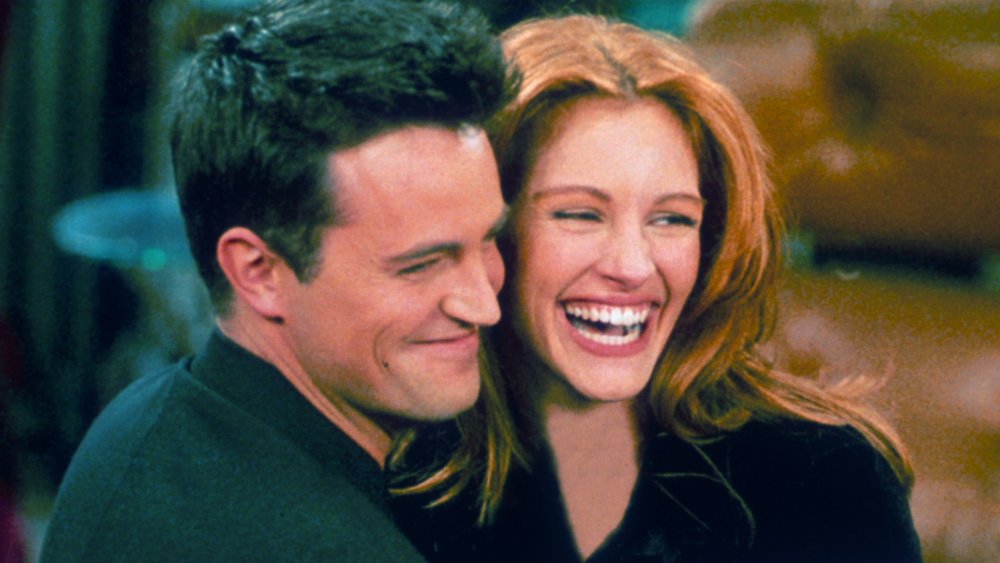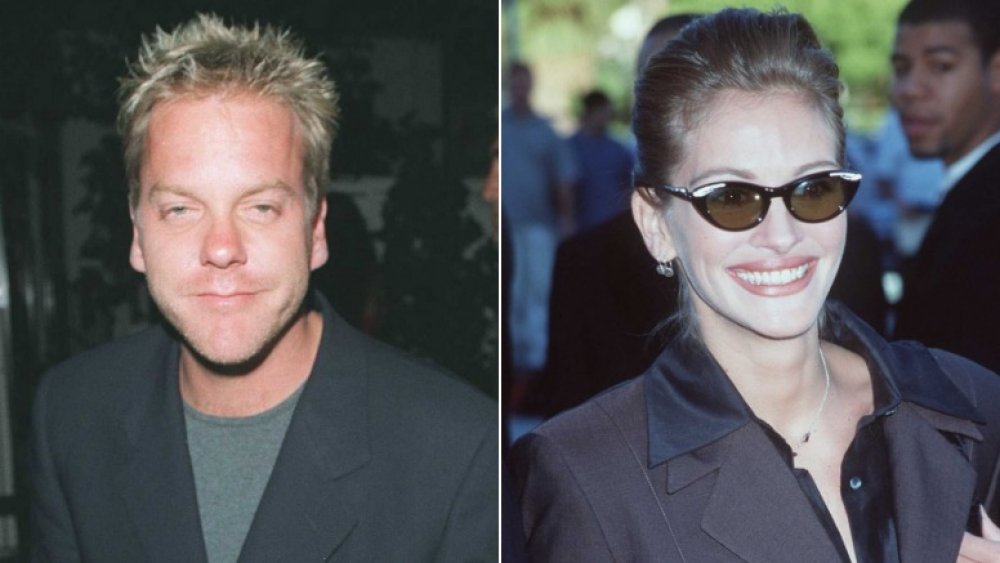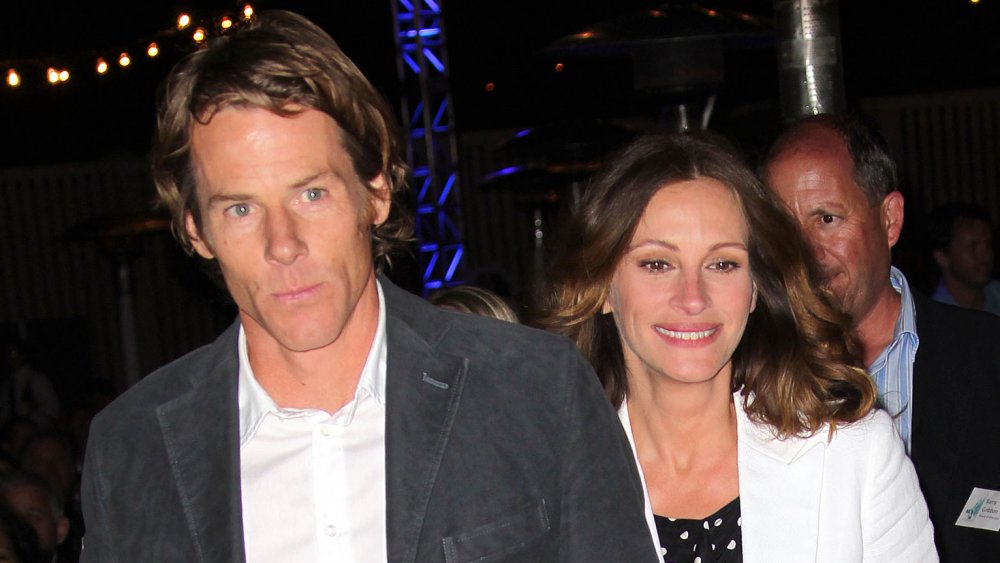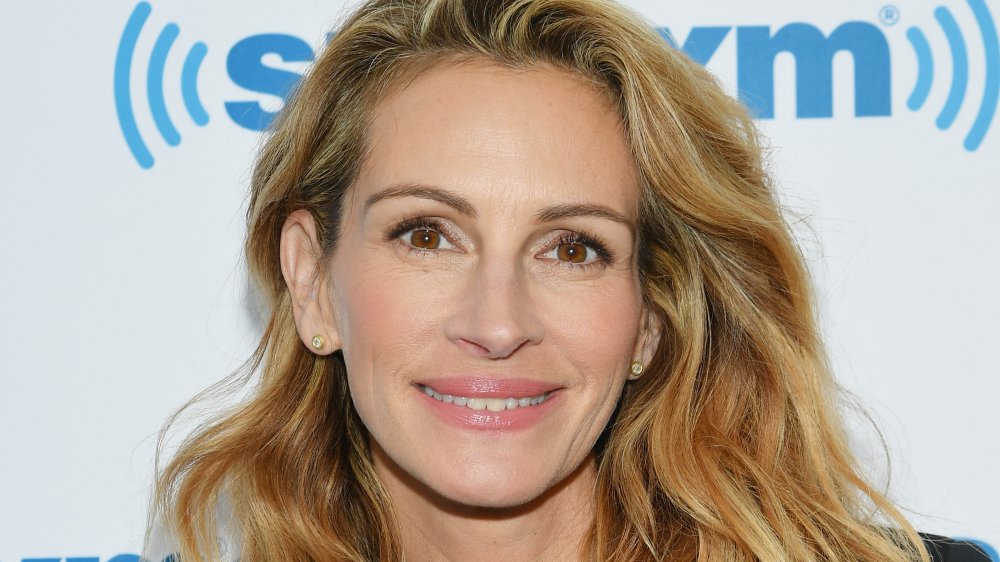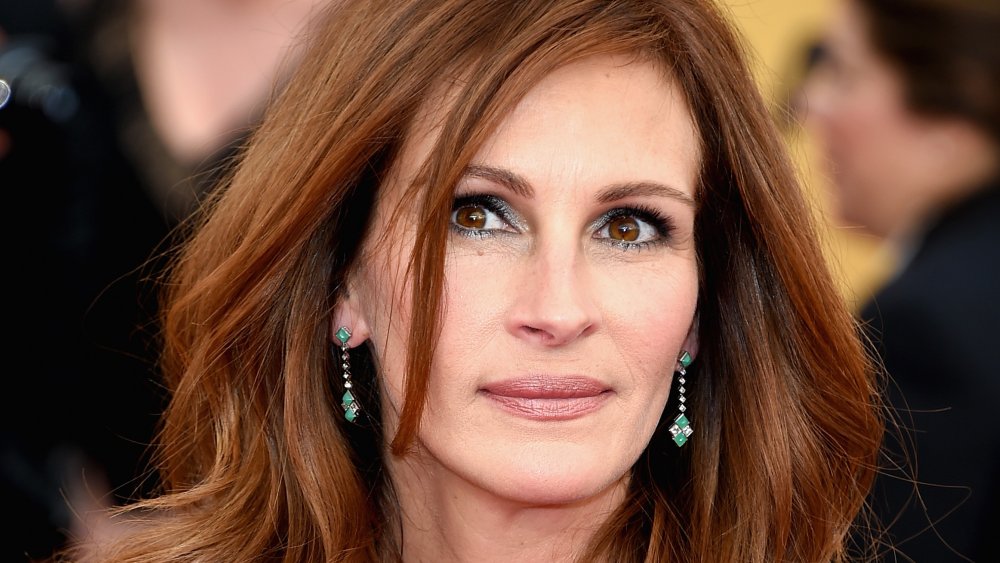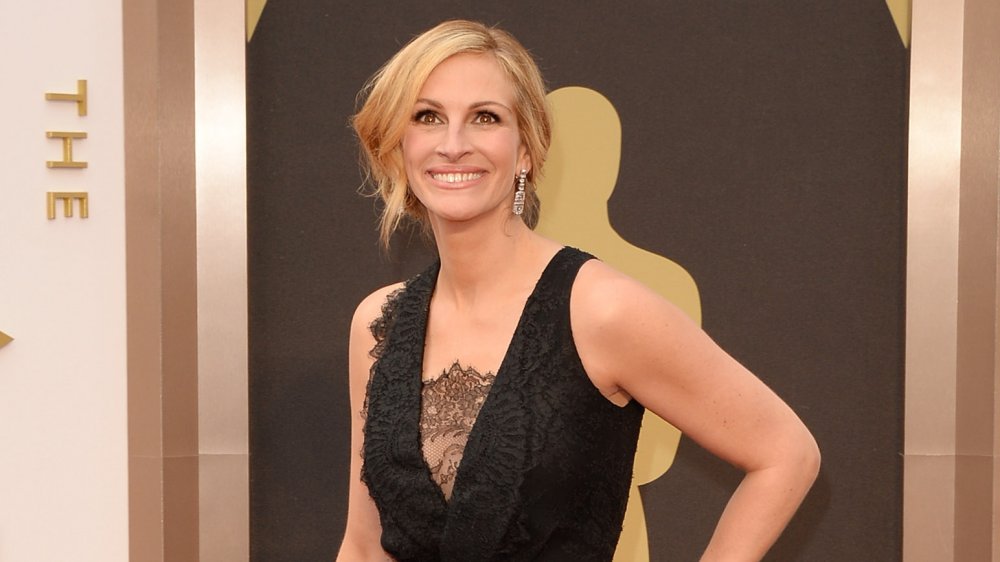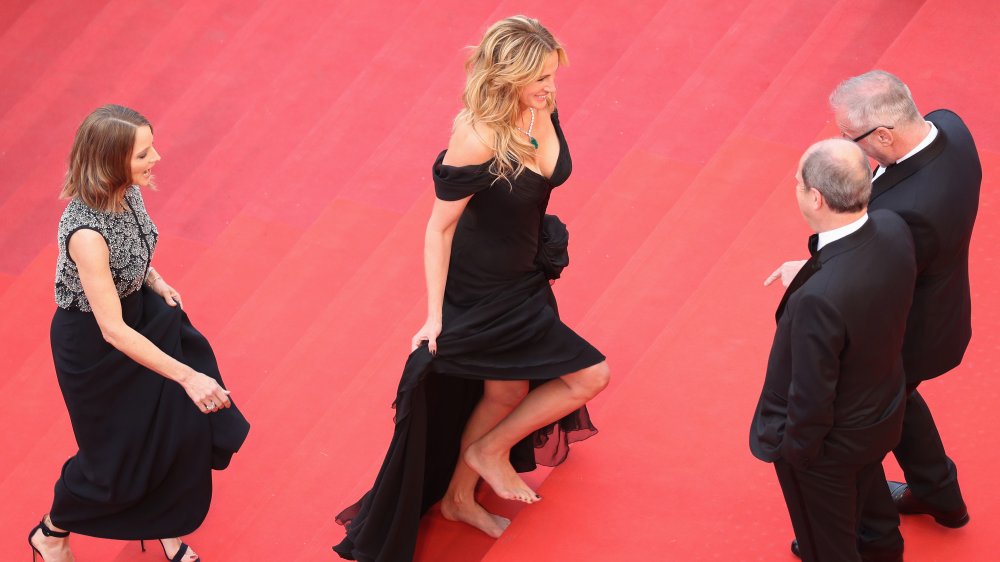Julia Roberts Has Made Some Controversial Decisions
Julia Roberts is one of the most famous women in Hollywood and has been ever since she took the world of show business by storm in the early '90s. Starring in blockbuster movies, earning industry-topping salaries, and ranking as one of the most powerful people in the business, she's also an Academy Award winner. But that doesn't mean that she hasn't made some controversial decisions along the way.
In fact, despite earning a reputation as an American sweetheart who dazzles fans with one of the most stunning smiles in the industry as well as an unmistakable laugh that can make anyone grin, Roberts earned a shady reputation for a few questionable moves she made in both her personal and professional life. Despite that, she doesn't seem to regret her choices. When asked by IndieLondon if there was any advice she would give herself, the star explained, "No, I think I made really solid decisions, and I would stand by them all over again."
Roberts also tries to learn from any mistakes, telling Entertainment Weekly, "Things just happen, and when good things happen you try to perpetuate that, and when bad things happen you try to learn from them and go on." That's perhaps why she's continued to thrive despite the occasional scandal. Check out some of the most quirky, questionable, and controversial decisions Julia Roberts has ever made.
Julia Roberts' role in Pretty Woman was risky in more ways than one
Although playing a prostitute onscreen can lead to acclaim, it was a risky move for Julia Roberts when she was still making her name in Hollywood. In 1991, she admitted to Entertainment Weekly of the star-making role in Pretty Woman. "[W]hen people indicate that I knew what I was getting into, I say, 'You must be mad!'"
But simply playing a professional companion wasn't the only risk that Roberts took. To prepare for the part, she spent time with real-life working girls, which was arranged by Barbara Marshall, the wife of the movie's director Garry Marshall. "I recruited two young women ... and I paid them $35 each to meet with Julia," Barbara told Page Six in 2019. Soon, "Julia yelled from the end of the hall, 'Bye, Barbara. We're going to take a drive.'" Barbara panicked and called Garry, saying, "Your star just left with a group of girls, and I think they were heading to Hollywood Boulevard. ... What if she doesn't come back?" Obviously, Roberts did return, surely to the relief of the Marshalls.
However, things didn't smooth over when the movie was released. The story faced criticism, such as Entertainment Weekly's review, which stated, "Pretty Woman pretends to be about how love transcends money, but ... is really obsessed with status symbols. It's saying Roberts' character becomes a better person when she lands a rich guy and learns to cry at the opera." Oof.
Pretty Woman wasn't Julia Roberts only controversial role
Julia Roberts may have portrayed a controversial character in Pretty Woman, but that wasn't the only risky role she's played. In 1991, she starred in Sleeping with the Enemy, which focused on domestic violence. Along with being a delicate part to take on, it also wasn't well received. Roger Ebert gave the film 1.5 stars, writing, "Sleeping with the Enemy is a slasher movie in disguise, an up-market version of the old exploitation formula where the victim can run, but she can't hide."
Roberts then appeared in 1996's Mary Reilly, a film about the maid of Dr. Jekyll and Mr. Hyde. It was another twist in the actress' career choices and another that didn't go over well. Describing her as "a high-priced movie queen," The New York Times' review of the film characterized her performance as "repetitive" and "without much spark." The review continued, "Clearly Ms. Roberts has the makings of a serious actress and the wherewithal to become one, but Mary Reilly offers a vehicle that is unrelievedly grim." That's perhaps why the film earned her a Razzie Award nomination for Worst Actress.
Things didn't get any less controversial when she signed on for Woody Allen's Everyone Says I Love You. And while Roberts hasn't talked about her decision to work with the disgraced director, plenty of performers now say they wouldn't appear in one of his movies or regret their decision to work with him.
Julia Roberts ditched her reputation as America's sweetheart
Julia Roberts was once considered to be one of America's sweethearts — even appearing in a film with that title — but she eventually decided to ditch the reputation. In 2003, she dismissed the relevance of the title, telling Oprah, "Somebody else is always going to be the next sweetheart. It's all contrivance: Label them as fast as you can so you can keep them all straight." Ten years later, when Roberts was asked by MTV (via BuzzFeed) how she felt about Jennifer Lawrence being one of the newest among the "elite group of America's sweethearts," she responded by saying, "My card is expired, and I didn't get a new one."
While that might make some stars sad, according to Buzzfeed, "the 'America's sweetheart' title ... comes with its own dangers. It's ... a target more than a halo. Decades before Jennifer Lawrence had to fend off hackers and slut-shamers alike, Roberts learned firsthand the way she could never live up to the image of her that the press had created."
Roberts also doesn't believe that she'd achieve the same status if she had broken into the business in more recent years. "I couldn't be an ingenue today," she told Oprah in 2003. "I remember when you could dress for a premiere just by putting on a cute top. Now you have to be perfect and fabulous in every way, or you're ridiculed." Perhaps being one of America's sweethearts isn't so sweet after all.
Julia Roberts got involved with her leading men
Julia Roberts' personal life has also faced fierce scrutiny, especially since she had a habit of getting involved with her costars. According to a Vanity Fair profile from 1999, "The awful truth was out: Julia Roberts had a weakness for leading men, particularly her own leading men, including Liam Neeson (Satisfaction), Dylan McDermott (Steel Magnolias), and [Kiefer] Sutherland (Flatliners). The story unfolded for three years, consuming Daniel Day-Lewis, Ethan Hawke, and Matthew Perry of Friends..."
The outlet explained that "within months, [Roberts] had mutated into the mainstream media's favorite piñata, thrashed by non-tabloid publications such as Newsweek, which fanned 'reports' from the British tabloids; People, which ran a sidebar comparing her box-office grosses with those of Kiefer Sutherland; Redbook, which offered odds on which star Roberts would date next (the favorite, at 1–1, was Gere); and Spy, which suggested a link between her love life and international disasters such as the Iraqi invasion of Kuwait."
Roberts told Vanity Fair, "I don't think I realized that the cost of fame is that it's open season on every moment of your life." She wasn't willing to back down though and when reports came out that she'd spent a night dancing with Ethan Hawke, she issued a statement, saying, "I love to dance, and I will continue to dance. In fact, I plan on doing as much dancing, with as many people, as possible. I will dance until I drop. How about that?" Point? Made.
The way Julia Roberts left Kiefer Sutherland left fans jaws dropped
In a situation that mirrored Julia Roberts roles in Runaway Bride, she "was engaged to [actor] Kiefer Sutherland, whom she then dumped three days before the big event," according to Vanity Fair. Unlike the film, the split was apparently caused by Sutherland's "acquaintance with the enormously buxom Amanda Rice — or just plain ol' 'Raven,' as she was known over at L.A.'s Crazy Girls Live Exotic Strip Show." Roberts reportedly "flew off to Ireland with Sutherland's best friend (well, ex-best friend), Jason Patric, only to dump him too."
Roberts opened up to Entertainment Weekly about the situation in 1991, saying, "It became something that was taking on speed, that everybody was going to have to know about. So it was a much bigger decision than just having to say to somebody, 'Let's not do this.' So that's unfortunate. And that also probably delayed my ability to realize what I had to realize — that I can't give a s**t about some lady in Boise who thinks I made the biggest mistake of my life or that I'm a bad person because I've done this."
As for Sutherland, he didn't hold a grudge and said during a 2016 appearance on The Jess Cagle Interview (via Hello!), "It wasn't what she wanted to do in the end. And [I think] it took a lot of courage ... to be able to say, I can't do this."
Did Julia Roberts and Daniel Moder's relationship have a shady start?
Julia Roberts met her current husband, cameraman Daniel Moder, on the set of The Mexican. At the time, Roberts was still dating former Law & Order actor Benjamin Bratt, and Moder was still married to a makeup artist named Vera Steimberg. Moder's ex-wife opened up to the UK's Sun (via the New York Post) about the messy situation in 2002, saying, "I'll never be able to forgive Julia — she's a husband stealer."
Steimberg also didn't seem to think that Roberts' relationship with Moder would stand the test of time. "It won't last with her anyway," she said. "[Roberts] will be looking for a new husband within a year. ... Danny has a roving eye ... and he won't change."
Despite that dire prediction, Roberts and Moder were married in 2002 and celebrated their 17th wedding anniversary in 2019. Roberts, who shares three children with Moder, talked to Oprah about her husband in 2003, saying that their marriage is a major factor in her overall contentment. "My husband, Danny, has really shined the light for me," she explained, adding, "Because of being married, I've met people and experienced all these little things that have nurtured my life — not so much changed it, just nurtured it in a way that's astounding." Ain't love grand?
Cosmetic surgery felt like a no-win situation for Julia Roberts
While getting plastic surgery can be a controversial choice, so can NOT getting plastic surgery, especially if you work in the entertainment industry. In 2014, when Julia Roberts was 46 years old, she told You magazine (via The Telegraph), "By Hollywood standards, I guess I've already taken a big risk in not having had a facelift."
Roberts was already thinking along those lines in 2010 when she told Elle, "It's unfortunate that we live in such a panicked, dysmorphic society where women don't even give themselves a chance to see what they'll look like as older persons. I want to have some idea of what I'll look like before I start cleaning the slates. I want my kids to know when I'm p*ssed, when I'm happy, and when I'm confounded. Your face tells a story ... and it shouldn't be a story about your drive to the doctor's office."
Roberts does admit that she's had a little work done, telling Access Hollywood Live in 2012, "I tried the Botox one time and was permanently surprised for a couple [of] months and it was not a cute look for me." However, she added, "[I]t's whatever works for the person. I don't want to judge somebody who can't turn their head or move their lips. I don't know — if you want your chin on your forehead I'm not one to [judge]. If that's going to bring you joy, I'm all for it."
Julia Roberts was a part of 'misleading' make-up ads
Despite the fact that Julia Roberts claims that she hasn't had a facelift to try to look younger, she was caught up in a scandal in 2011 over "misleading" make-up ads. The L'Oreal campaign which featured the star as a model for one of the brand's foundations was banned in the UK for being overly airbrushed and because, as UK Minister of Parliament Jo Swinson deemed (via the BBC), the ads were "not representative of the results the products could achieve." The Advertising Standards Authority (ASA) chief executive Guy Parker also explained to the BBC that L'Oreal was unable to show how much retouching had been done to the ad's images. "Advertisers must be able to provide appropriate material to us to demonstrate what retouching they've done in the event we question them, and they mustn't mislead," he said.
Swinson also told the outlet, "There's a big picture here which is half of young women between 16 and 21 say they would consider cosmetic surgery and we've seen eating disorders more than double in the last 15 years. There's a problem out there with body image and confidence. The way excessive retouching has become pervasive in our society is contributing to that problem."
Swinson also told The Guardian, "We need to bring some honesty into advertising." She continued by explaining that "big money" is made from ads that feature images of "flawless women," saying, "It's dishonest, it's harmful and it has got to change."
A sleeve length miscalculation caused huge controversy for Julia Roberts
Women who embrace unshaved underarms are more and more common in Hollywood these days, but it wasn't always that way. That's why, back in April 1999, some people were shocked when Julia Roberts showed up to the premiere of Notting Hill and waved to the crowd showing off hairy armpits. Writer Marci Robin reflected on the moment for Allure in 2018, recalling, "I personally remember widespread conversation about the moment nearly upstaging the movie's opening weekend, and a little stealth Googling reveals that tabloids made unsubstantiated claims about Roberts's motives ranging from making a feminist statement to wearing her body hair the way then-boyfriend Benjamin Bratt preferred."
And while there was a buzz over the body hair, "Roberts said pretty much nothing about what more judgmental observers considered a beauty faux pas, only adding to the impression that she didn't give a fuzz."
While it indeed caused a stir, in 2018 while sitting down to chat on Busy Tonight with Busy Philipps — who deemed it "one of the most iconic, feminist red carpet moments ever" in the caption of the Instagram post of the chat — Roberts explained, "I think I just hadn't really calculated my sleeve length and the waving and how those two things would go together and reveal personal things about me. So it wasn't so much a statement as it's just part of the statement I make as a human on the planet for myself." Fair enough.
Julia Roberts went barefoot on the Cannes red carpet
The Cannes Film Festival is one of the industry's most prestigious events, so it has an (appropriately? archaically?) strict dress code. That's why Julia Roberts had people talking in 2016 when she made the controversial decision to strut around barefoot. While strutting down the red carpet ahead of the premiere of Money Monster, dressed in a sleek black Armani Privé gown and wearing a stunning jeweled necklace, Roberts had eyebrows raising when she freed her feet.
According to Vanity Fair, "This blatant act of fashion rebellion [came] just a year after festival organizers allegedly turned away a group of women in their 50s from a screening of Carol for not wearing high heels." While Screen Daily reported that "the festival declined to comment on the matter, but did confirm that it is obligatory for all women to wear high-heels to red-carpet screenings."
Roberts responded to the situation, telling Australia's Sunrise channel (via Us Weekly), "A lot was happening from my ankles up. Let's not forget all that. A lot of time and effort went into ankles up. I just want to say for the record ... I looked nice last night!" There's no doubt about that. And Vanity Fair explains that "making it at least part of the way down a Cannes red carpet without shoes is one small step for gender parity in dress codes." Sometimes to take a step forward, you need to ditch your stilettos.

